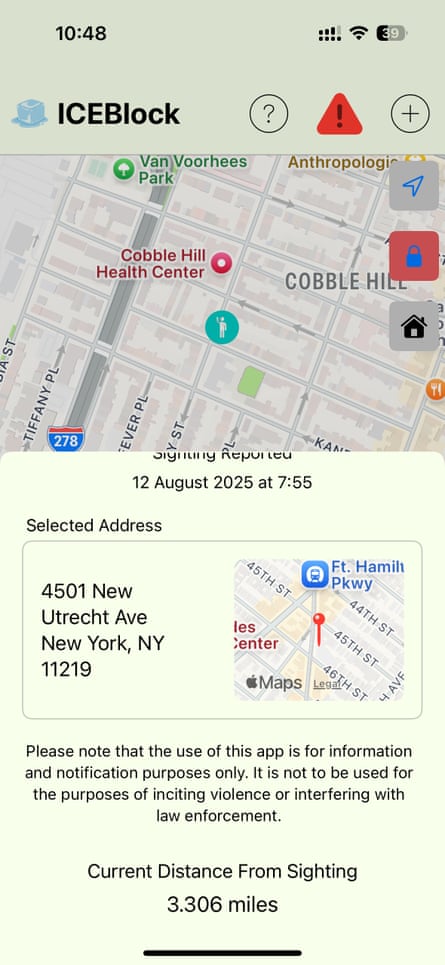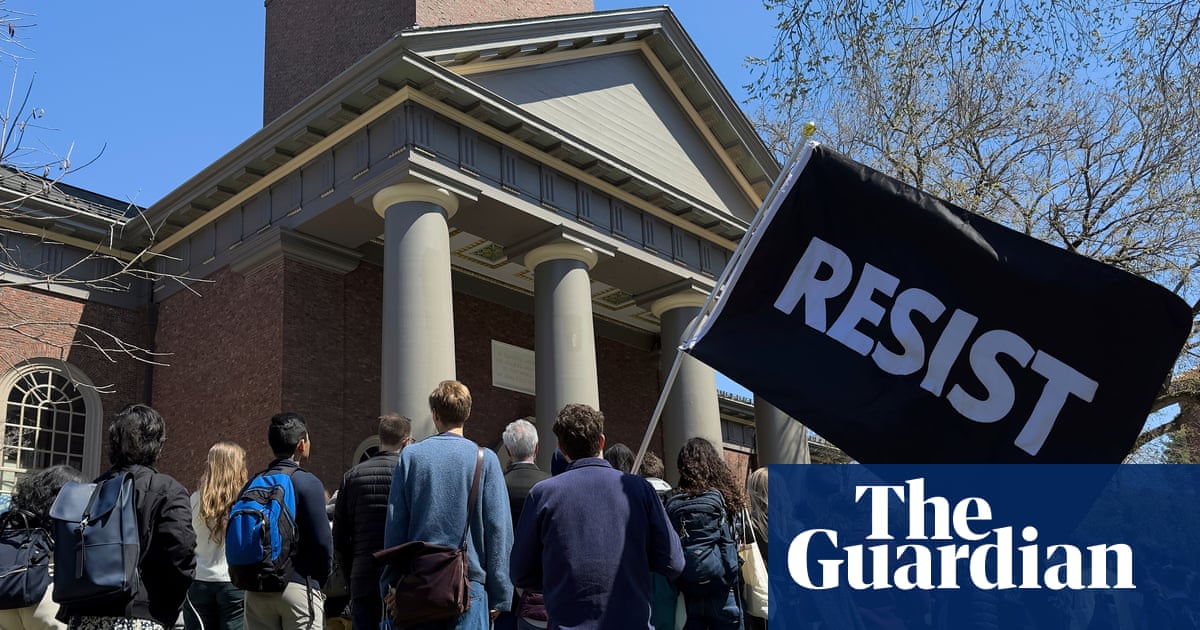For many undocumented immigrants living in the US, the constant threat of Ice raids has turned their homes into prisons. Leaving the house to go to work, school, buy groceries or the doctor’s office all carry unthinkable risks.
It’s a problem that Joshua Aaron wanted to tackle. A former indie musician (he played bass in 2000s buzz band The Rosenbergs and later fronted his own group Stealing Heather) turned app entrepreneur, he set about making an app that could spot Ice and alert people, the same way drivers let other drivers know about traffic stops on Waze.
Launched without fanfare and with no intention of profit in April 2025, IceBlock offers real-time alerts about the presence of agents – while, Aaron claims, fiercely guarding the anonymity of its users. Within two months, the app had soared on the charts in Apple’s app store – prompting US homeland security secretary Kristi Noem to attack the app and its founder, claiming they were “obstructing justice”. She claimed she wanted to work with the Department of Justice to try to prosecute CNN for reporting on the app.
Noem’s intervention ensured the app topped the charts for a number of days (although it has since fallen out of the top 100). Then last month Aaron’s wife, Carolyn Feinstein, was fired from her Department of Justice job in Austin, Texas. The couple believe it was clear “retaliation” for the app, despite Feinstein not being involved in the app’s creation or promotion.
Aaron is an unlikely figure in this space – he has a brash, rock’n’roll demeanor and not much experience in immigration activism. His background has led to some questions about how well the app protects its users, especially as it asks you to keep your location data on at all times. But a number of independent investigations have shown he is managing to keep users anonymous.
Aaron spoke with the Guardian a week after his wife’s arrest.
First of all, what happened to your wife? Why was she fired?
They fired her as retribution against me. They can’t do shit to me. I’m not going to be afraid. So they fired her.

Were they explicit in in why they were firing her?
No, that’s the crazy part, in her termination letter, she got accused of lack of candor but they didn’t mention the app. But the Department of Justice responded to every journalist that reached out in, like, five minutes. They had a prepared statement for an auditor in Austin? In the US trustee department? They have nothing to do with immigration. They have nothing to do with anything else with the DoJ, they’re a whole separate division that handles bankruptcy.
What did they say?
They had this prepared statement, they accused her of threatening law enforcement officers and endangering the lives of Ice agents and all this horrible shit. It was very different from her termination letter. The whole thing started when Laura Loomer doxed her on X and then said that she spoke to Tom Homan. Homan goes on Newsmax and says that he spoke to the DoJ, which obviously is [headed by] Pam Bondi. Twenty-four hours later, my wife gets a termination letter from the deputy director of the DoJ. It was pretty obvious that it went from Loomer to Homan and to Bondi to “You’re fired.” That was it.
It must be tough for your family.
She worked there for almost a decade. She has decades of experience in the private sector, and she’s really, really good at what she does, and was honestly beloved by everyone she worked with. They just basically fired her and accused her of all this horrible stuff, and none of it’s true. It really, really sucks. She misses it terribly.
Are you worried about other ways the Trump administration might retaliate?
Well, you have Pam Bondi accusing me and saying, I better “watch out.” Please, come on. I better watch out? Why? I’m protected under the first amendment. This is perfectly legal, and I made sure of that – I checked with multiple constitutional attorneys and criminal attorneys before I released this app, because I was concerned about whether I’m protected. And everyone agreed 100% this is protected speech.
Can you explain briefly how IceBlock works?
Well it can only be downloaded from the US app store, and people can only report sightings within a five-mile radius of where they are currently. Then all sightings get deleted after four hours. So let’s say there are 100 people in a five-mile area, and one person sees Ice – they’re walking down the street, whatever – and they go, “Oh, shit.” And they report it. All the other users in that five-mile radius get an immediate notification that shows up on their phone.
The app has been live for quite a few months. Do you get the sense it’s actually being used to by people who are worried about Ice?
I have no idea, because it’s 100% anonymous. We don’t track those metrics. I get asked all the time: “Where are most of your users?” I have no fucking idea. “How many sightings do you get per hour?” I don’t know. We don’t track this. It’s so hard to answer these basic questions that normal apps would be able to answer because there is the whole core principle of anonymity. We don’t have that data, and I don’t want it. The only thing I can tell you is that currently on the app we have 445 sightings nationwide [likely over a four-hour window due to the fact that sightings stay up for four hours once reported] and we have just about 1 million users that have this installed on their phones right now.
But is it being downloaded by well-meaning liberals who support what you’re doing? Or is it doing its practical job and helping undocumented people as a practical tool in their lives? Maybe we just can’t know that yet?
I would say this, most people who download the app are doing it to keep themselves safe, so they want to know what’s going on around their five-mile radius. So yes, I think it’s very much being used for how it’s intended to be used. I didn’t want to have to build this, but it is a necessity. It is a tool as this early warning system that does keep people safe, and it is, I think, giving people peace of mind, especially those who are most affected by it or most at risk. It allows them to go to that restaurant or walk around that neighborhood with a little bit of peace of mind.

What were the initial fears and challenges? Did you worry about whether the Apple app store was going to allow it on?
How confident was I could do it? I don’t want to sound egotistical – and don’t print this so I sound like a fucking asshole – but, dude, I can fucking do it. Of course, I could do it. Even with my music career, I built audio studios, and I was a producer and a mix engineer, and I designed gear. So I’ve always kind of been on that tech engineering side of things like, that’s just how my brain works. And I’ve been coding a healthcare app for the past four and a half years. So as far as could I write the code? Could I make it happen? This is a crazy easy app. Would it be approved by Apple? That was an interesting one, because nothing like it has ever been done before.
When I brought it to Apple and I submitted it to the app store, it got pushed back, and it took three weeks of going back and forth with Apple’s legal department and higher ups in Apple’s app review, and there were conversations almost on a daily basis with senior people there saying: “Is this even legal? Can we do this? Are we going to get in trouble for having this?”
Apple had a hard time wrapping their head around it, because they were like, “What do you mean you’re never going to make money? What do you mean you’re never going to track anything?” I was like, “Yeah, that’s the point. I don’t care.” I don’t care about people’s data as far as, like, being able to get analytics or track them or sell their data. I don’t care about any of that. I care about keeping people safe. That is literally the whole point. Eventually they allowed it on. (Apple and the Department of Justice did not return requests for comment.)
Because there are no user accounts, and no way of you seeing what’s happening on the app, there’s no way to block bad actors. Does that mean there is a possibility of people reporting false sightings?
I can’t verify the sightings without driving to rural Indiana and seeing if they’re there. I’ve put in safeguards: you can only report a sighting once every five minutes so you can’t just spam the database; all sightings are deleted after four hours; it has to be a real address – you can’t type in 123 Main Street; and you can only report within your own five-mile radius. So with all of those safeguards – are there any false sightings? Yes, of course there are. Are they prevalent? No, because it would be too time consuming. And what’s the worst case scenario for a false sighting anyway? That a user gets a notification on their device and says: “Hey, I’ll stay away from that address for a couple hours?” Who gives a shit.
So beyond helping people – what’s your personal interest in developing these apps? You’re also working on a healthcare app which is also focused on keeping patient data private.
Yes, my whole thing is very, very privacy focused. I don’t use Gmail. I run my own mail servers. I run my own web servers. I have always done that because I just don’t trust these companies who are reading all of your messages, and they’re doing it to harvest your data and market to you. I want myself to be private. I’m an individual. I think that lent quite a bit to the way that I thought about IceBlock.
I’ve had my IceBlock open while we’ve been on the phone, and there’s been one reported sighting in my area.
Yeah, isn’t that nice to know that? I mean, you’re British right, obviously you are not a native-born American. So now you know maybe don’t go over in that area for the next couple hours. Not a big deal.
This interview has been edited and condensed for clarity

 German (DE)
German (DE)  English (US)
English (US)  Spanish (ES)
Spanish (ES)  French (FR)
French (FR)  Hindi (IN)
Hindi (IN)  Italian (IT)
Italian (IT)  Russian (RU)
Russian (RU)  15 hours ago
15 hours ago
























Comments